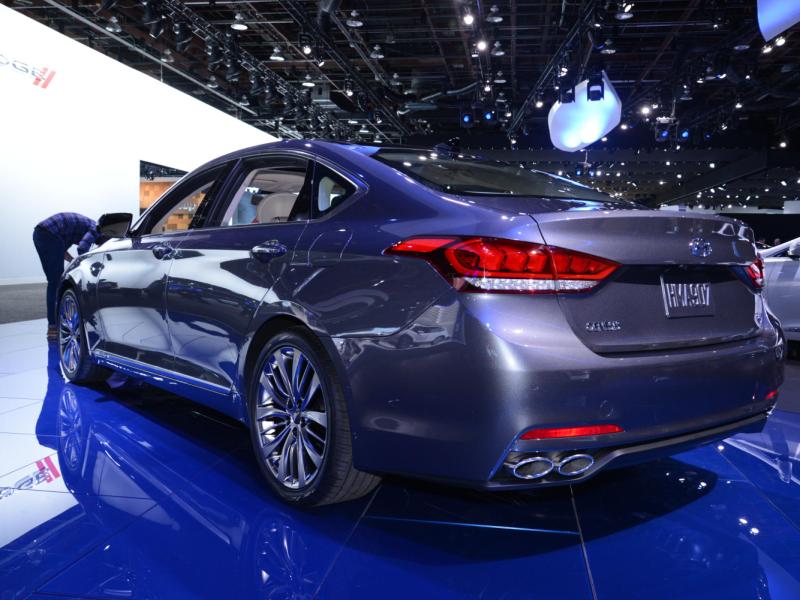Recent Articles
Popular Makes
Body Types
10 Things You Need To Know About The 2015 Hyundai Genesis
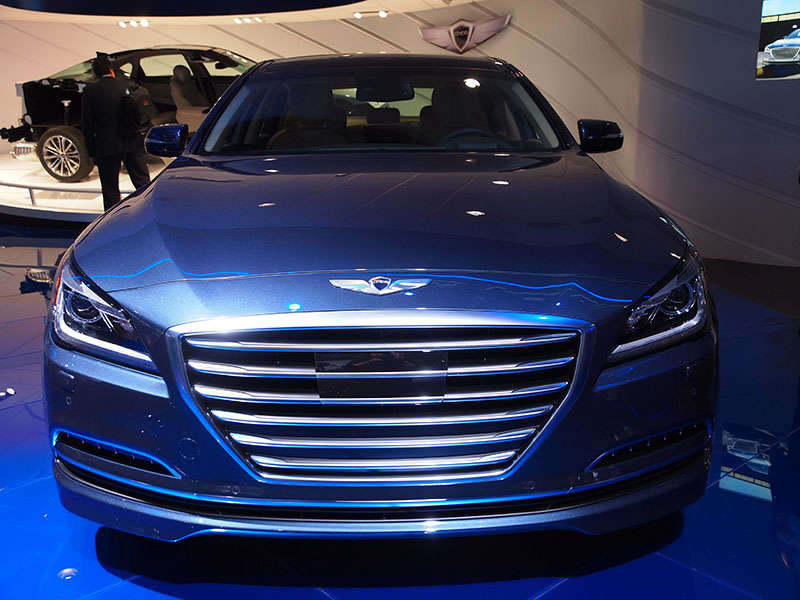
The 2015 Hyundai Genesis burst onto the stage in Detroit this past year to introduce the world to the second generation of the Korean automaker's mid-size luxury sedan. Wearing the brand's new 'Fluidic Sculpture 2.0' styling, the new Hyundai Genesis features a mature look that goes hand in hand with a thorough re-think of the vehicle's entire platform. Tighter, more comfortable, and with increased driver engagement compared to the departing model, the 2015 Hyundai Genesis aims to peel even greater numbers of customers away from its European luxury rivals.
Let's take a look at 10 things you need to know about the 2015 Hyundai Genesis.
01. The 2015 Hyundai Genesis Rides On A New Platform
The 2015 Hyundai Genesis has seen its sedan platform significantly massaged in order to present a more competitive face to premium buyers. Like most mid-size luxury models, the Hyundai Genesis is now a little bit longer than it used to be, including a 2.9 inch wheelbase boost and a total length of just over 196 inches. Overall chassis stiffness has been improved by 40 percent, but unfortunately, curb weight has risen, too (4,138 lbs in total). Hyundai has elected to use much more high-strength steel in its current design, with 50 percent of the vehicle's platform composed of the stuff.
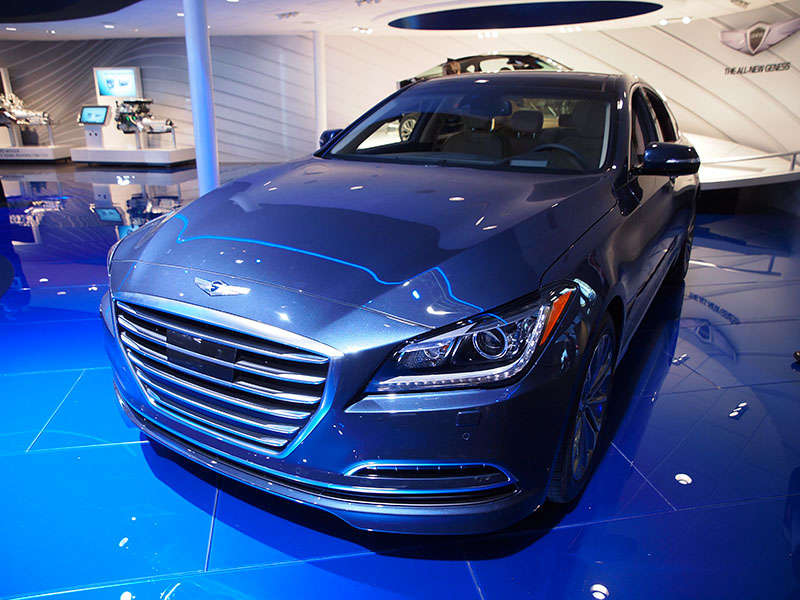
02. The 2015 Hyundai Genesis Features All-New Styling
Fluidic Sculpture 2.0 can be seen as a step back from the swooping lines of earlier Hyundai sedans and a move closer to harder angles and more imposing surfaces. The 2015 Hyundai Genesis is our first glimpse of what will soon become standard across the Hyundai line-up, and it delivers a kind of understated elegance with a hint of muscularity. The Hyundai Genesis features a strong front fascia along with rippling creases rising up from its hood, and the vehicle's semi-slab sides and brief rear deck convey an image of power and solidity that was absent from the 2014 edition's less distinctive visual personality.
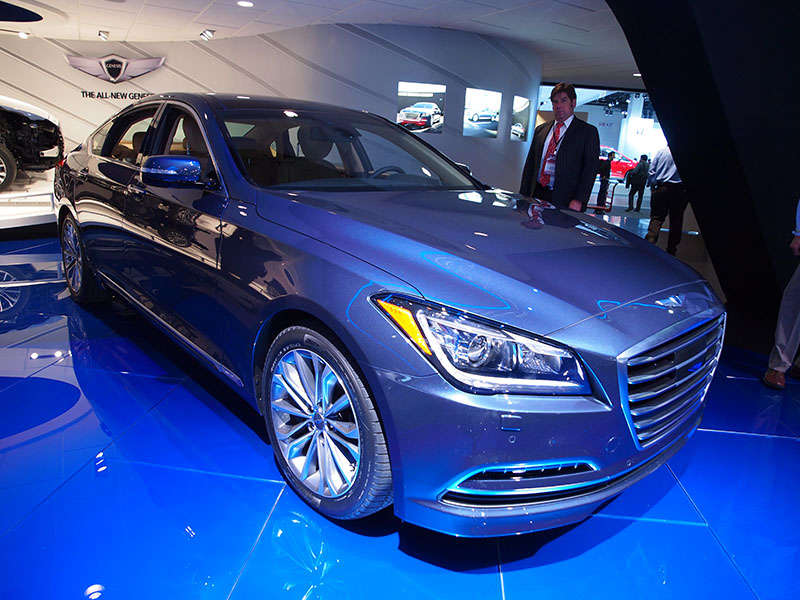
03. The 2015 Hyundai Genesis Comes With A Completely Re-Done Interior
The 2015 Hyundai Genesis has not had its passenger compartment ignored during the course of its recent redesign. The Hyundai Genesis has broadened the concept of what a luxury sedan's dashboard should look like, hewing more to the traditional, and expansive design of old rather than the hand-in-glove cockpit setups offered by classmates from BMW and Mercedes-Benz. The result is a feeling of spaciousness that permeates the entire cabin, and the company has also invested in higher-end materials (with a plusher feel) as well as better sound deadening to keep out the roar of the outside world. Passengers will also enjoy more room inside the Genesis than is found in any of its key competitors.
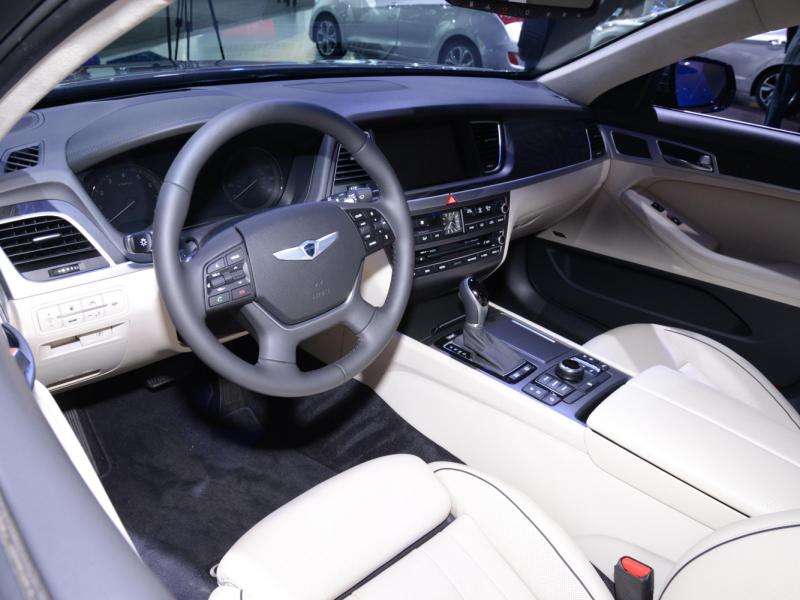
04. The 2015 Hyundai Genesis Carries Over Last Year's Engines
The 2015 Hyundai Genesis features a pair of familiar faces in its engine compartment. Although the displacement of the car's 3.8-liter might be the same, it has seen its programming tweaked to move power delivery down to a more usable area of the rev range. The result is a new rating of 311 ponies and 293 lb-ft of torque, which is a dip of 22 horses when compared against the 2014 edition of the car. The 5.0-liter V-8 that is optional with the Hyundai Genesis also sees a drop in output, although its nine lost ponies are made up for by a 7 lb-ft torque boost. Total oomph from the eight-cylinder mill is listed at 420 horsepower and 383 lb-ft of torque.
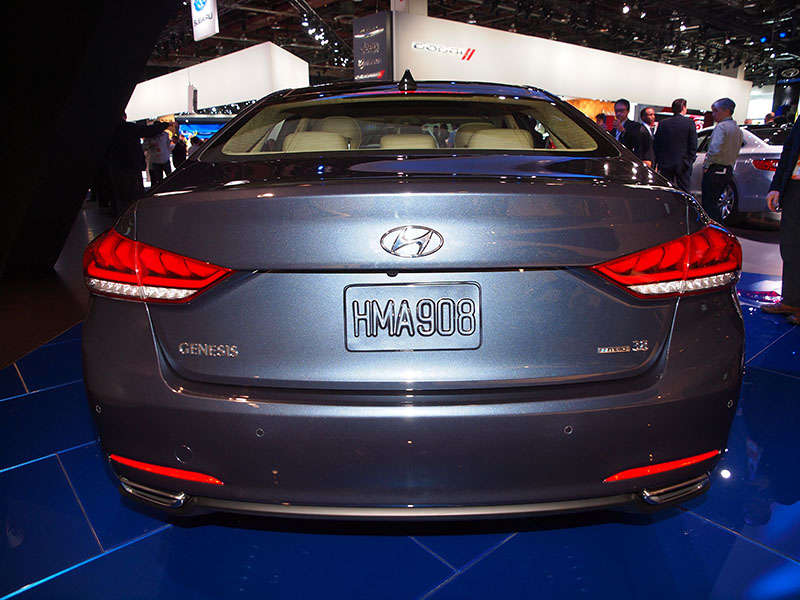
05. The 2015 Hyundai Genesis Adds HTRAC All-Wheel Drive
For years the Hyundai Genesis had to put up with complaints from northern drivers about its lack of an all-wheel drive option - an oversight that kept Hyundai from accessing a significant portion of the luxury market. The 2015 Hyundai Genesis makes up for it by providing the availability of HTRAC all-wheel drive with six-cylinder versions of the sedan. HTRAC offers a nominal torque split of 40 percent front / 60 percent rear during normal driving, but it's capable of sending almost all engine output to either end of the car depending on what conditions warrant. It also comes with three different driving modes: Sport, which maximizes rear power transfer in order to promote more engaging driving dynamics, Eco, which also prizes rear-wheel torque during highway cruising in order to reduce driveline loss and improve efficiency, and Normal.
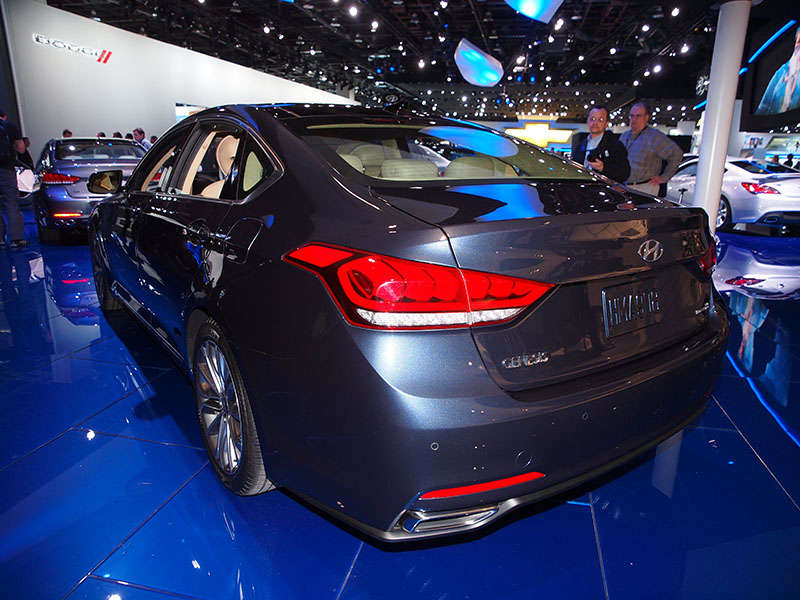
06. The 2015 Hyundai Genesis Features An Eight-Speed Automatic Transmission
The 2015 Hyundai Genesis has seen changes made to the eight-speed automatic transmission that was standard with the car for 2014. The Hyundai Genesis now comes with shift mapping that is better attuned to each respective engine's power band, and it also changes gears more rapidly at full throttle (regardless of whether Sport mode has been engaged). The refined transmission combined with an electric power steering system to improve fuel mileage to 18-mpg city and 29-mpg highway for the six-cylinder Genesis in rear-wheel drive form (all-wheel drive models are a bit thirstier). The V-8 model holds fast at 15-mpg around town and 23-mpg on the highway.
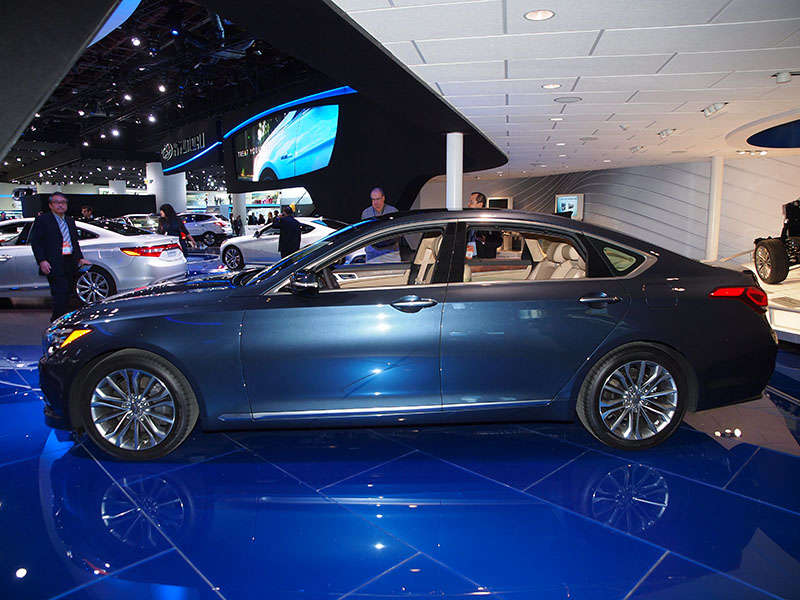
07. The 2015 Hyundai Genesis Gains Sportier Handling
The 2015 Hyundai Genesis might be a bit heavier than before, but it's more adept at taking corners thanks to a series of changes that have been made to its chassis. The Hyundai Genesis features a new five-link suspension setup at the rear, and weight distribution now sits at 52 percent front / 48 percent rear for better balance. A revised front suspension system allows for greater wheel travel, and it's possible to order an adaptive suspension system with the 5.0-liter V-8 edition of the Genesis. The electric power steering system that contributes to overall fuel efficiency also provides a more direct feel through the wheel than it did with the previous generation of the car.
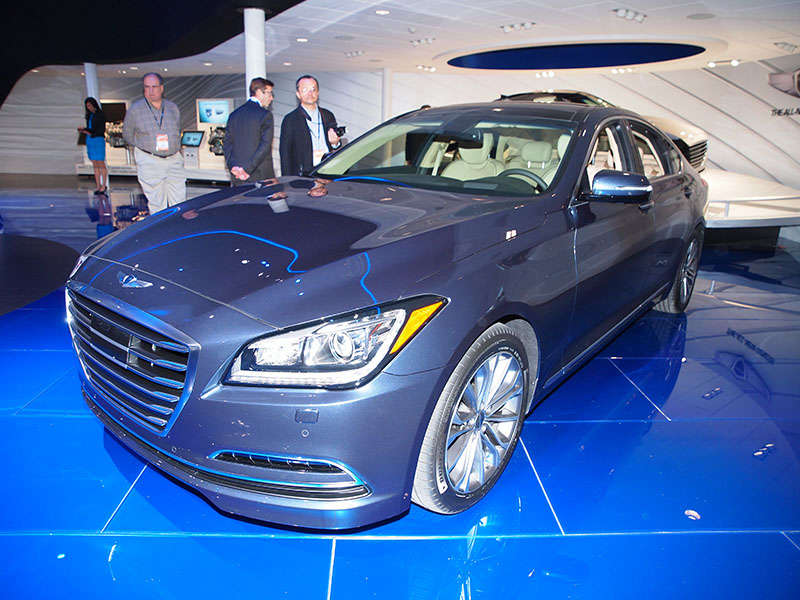
08. The 2015 Hyundai Genesis Offers Intriguing Options Packages
The 2015 Hyundai Genesis continues to offer a high level of standard equipment, which speaks to the value focus that has become a Hyundai trademark. The Hyundai Genesis additionally makes a number of high end features available via the options list. Selecting the Signature package introduces HID headlights, heated and cooled front seats, and a blind spot monitoring system, while the Technology package (which must be bundled with the Signature package at ordering time) provides upgraded leather upholstery, additional power adjustments for the driver's seat, an LCD gauge cluster, touch controls on the steering wheel, and adaptive cruise control. The Ultimate package installs a 9.2-inch LCD navigation screen as well as an upgraded climate control system.
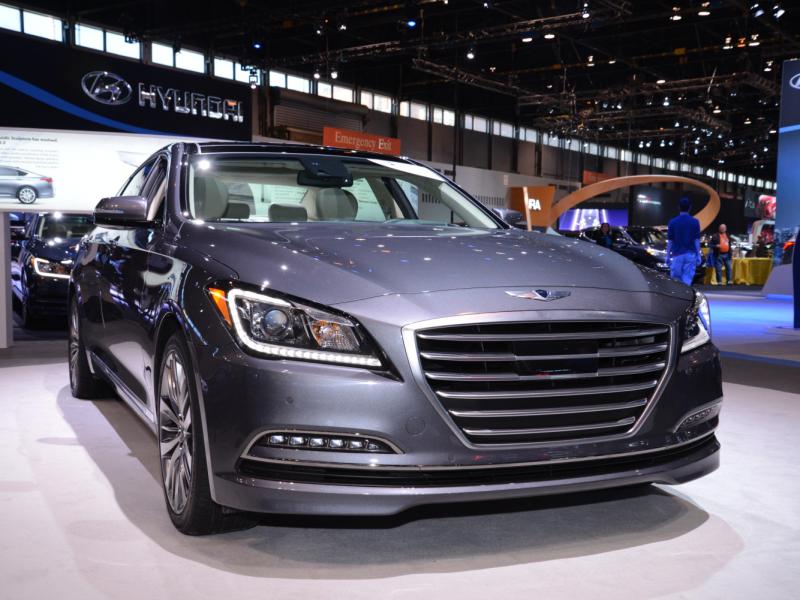
09. The 2015 Hyundai Genesis Introduces Fresh Safety Features
The 2015 Hyundai Genesis with the Signature and Technology package adds more than just convenience via its adaptive cruise control function. This feature, which operates at a full range of speeds and can even keep up with the flow of stop and go traffic, can also automatically halt the Hyundai Genesis if it detects that a forward collision is imminent. Full-stop braking is available between five and 50 miles per hour, with partial braking offered between 50 and 112 miles per hour. The Technology package also adds a lane keeping system that can steer the sedan to keep it between the lines when out on the road. Finally, Hyundai has also installed a C02 sensor inside the Genesis (available with the Ultimate options package) that monitors the level of carbon dioxide in the car as a way of determining whether passengers are getting too sleepy. If the level gets too high, the vehicle automatically pulls in fresh air from outside.
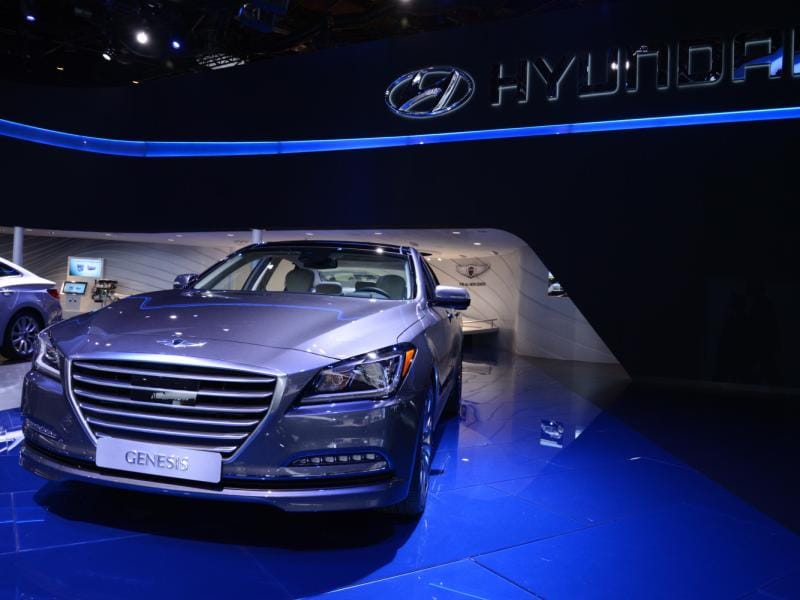
10. The 2015 Hyundai Genesis Undercuts Rivals In Pricing
The 2015 Hyundai Genesis starts at an MSRP of $38,000, which represents an almost $3,000 increase over last year's version of the car. Still, that figure stands out as an exceptional value when compared against the entry-level editions of the BMW 5 Series (MSRP $49,500), the Cadillac CTS (MSRP $45,100), and the Lexus GS (MSRP $47,700). Stepping up to the eight-cylinder version of the Hyundai Genesis does ask for a sizable chunk of additional cash, however: it'll cost you $51,500 to pilot the 5.0-liter model home from the dealership. A steep increase, but still stickering well below similarly-powered competitors.
